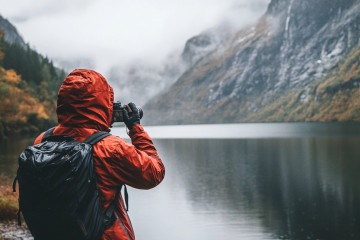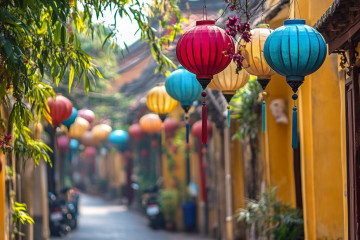Learn 15 easy ways to stay safe from scams, theft, and other common safety concerns while traveling. Everyone should know these simple travel safety tips that can be used anywhere.
From drive-by purse snatchers to identity thieves to much more dangerous criminals like kidnappers and sex traffickers, there’s always some story in the news about someone taking advantage of travelers.
So far in my travels, I’ve never had any serious problems, thank goodness, and the vast majority of travelers will never fall victim to anything more serious than pick-pocketing. Even so, I always keep these safety practices in mind when I travel, and I recommend you do, too.
If you’re planning your next trip and wondering how to travel safely, look no further than these 15 simple and straightforward travel safety tips for your ultimate safe travel guide.
15 simple travel safety tips everyone should know
1. Don’t wear flashy jewelry
Wearing expensive, flashy jewelry is one sure way to make yourself an obvious target for robbery. Leave it at home, friends, especially if you plan to travel to crowded areas!
2. Drink responsibly
This has to be one of the most important safety tips for travelers.
Lots of people enjoy exploring the local nightlife while traveling, and there’s nothing wrong with that. But keep in mind that it’s even more important than ever to drink responsibly when you’re traveling.
When you’re away from home you’re more likely to get lost or end up in a dangerous neighborhood, and being obviously drunk makes you an easy target for scams, robbery, or worse.
Oh, and ladies, never forget the golden rule of safe drinking in public: keep an eye on your drink at all times!
3. Be smart about your money
Any solid resource of travel safety information will tell you that it’s never a good idea to carry huge amounts of cash. Instead, open an account with an international bank or credit card company so you can use local ATMs. If you absolutely must withdraw large amounts of cash at once, leave the bulk of it locked up safely in your hotel or hostel and carry only what you’ll need for the day.
When using ATMs, try to use only those that are attached to banks as these are less likely to have been tampered with by scammers.
Never keep all of your money in one place. Keep cash and credit cards in two or three different places so that if one of your stashes is stolen you aren’t left completely empty-handed.
4. Be aware of popular scams
Research the place you’re visiting to see what the local scammers are up to. Scams range from RFID scanners to ploys using children to play on your sympathy. You’ll be less likely to fall for these scams if you’ve heard about them ahead of time.
5. Know the phone number for emergency services
Be sure to look up the emergency services number for your destination, even before you get there. It’s also a good idea to look up the number for your country’s nearest embassy before you leave. Write them down or save them in your phone so you’ll have quick access to them in the event of an emergency.
6. Use the right bag
Cross-body bags are safer than shoulder or hand bags and can prevent people from grabbing your bag as they run or drive by. There are tons of bags made specifically for travelers with features such as slash-proof straps, RFID blockers, and locking zippers. Invest in a good bag that suits your needs and preferences.
7. Bring travel locks and use them
You can save a few bucks by coming prepared with your own lock if you plan to stay in a hostel. Even if you’re not staying in a hostel, having a travel lock that can secure your bag to your seat or chair while dining or in transit will help keep your valuables safe from theft.
8. Keep digital copies of important documents
When traveling, your passport may be the most valuable thing you carry. In the event of a stolen passport, having a digital copy will help make the process of getting a replacement easier.
9. Try to blend in
Tourists tend to carry larger amounts of cash and valuables and are more vulnerable to scams. Try to avoid being an obvious tourist.
Dress as the locals do, don’t stop abruptly in the middle of busy streets to take photos, and even when you’re lost try not to make it apparent. If you need to ask for directions or consult a map, step inside a shop or cafe to do so.
10. Use reputable transportation companies
Research which taxi companies are reputable before you arrive in a place, and use only those. If you’re ride-sharing using an app like Uber or Lyft, double check your driver’s vehicle information and verify their name before you get in the car with them.
11. Check in with friends and family often
Before you leave let someone know your itinerary, and update them to any changes of plans. Make a habit of checking in with a close friend or family member back home at the end of each day.
I know this can seem like a hassle, but ultimately it’s better to be safe than sorry. If something terrible were to happen, you’ll get help faster if someone knows where you were supposed to be that day.
12. Ask locals for advice
When you check in at a hotel or hostel, ask for recommendations about which neighborhoods are safe and which are not so safe and mark places to avoid on your map.
13. Use apps for emergency alerts
There are a variety of apps out there aimed to provide safety travel information and help travelers safe.
- Sitata is a great app that alerts users to potential dangers or disruptions to travel in real time. It also includes tips for avoiding the latest scams and helps users locate nearby hospitals.
- Smart Traveler is the official U.S. State Department app for travelers. There are many useful features, including notifications for travel advisories and alerts and locations of U.S. embassies. I’m sure there are similar apps for citizens of other countries, but I was unable to find any information about them online.
14. Stay aware of your surroundings
You should always pay attention to what’s going on around you, whether you are in a crowded tourist spot or walking down an empty street.
Would-be offenders often seek out people who are distracted or disengaged from their surroundings to target. This is particularly important for solo travelers, especially solo female travelers.
15. Trust your instincts
If someone or some place is making you uncomfortable, there’s mostly likely a reason. Often our subconscious picks up on things that we aren’t consciously aware of, and that’s where our “gut feelings” come from. Listen to those feelings. They will help you stay safe.


